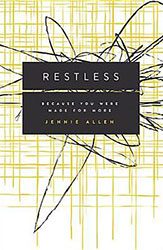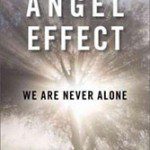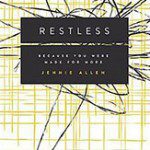“Why does it feel so hard to not be numb? Because there is a war waging for our hearts, to shut them down. To disable those who love Jesus, and especially those who are surrendered.” — Jennie Allen, Restless
This month, the Patheos Book Club is featuring popular Bible teacher and author Jennie Allen’s new book, Restless: Because You Were Made For More. We caught up with Jennie this week to ask her about the inspiration for her book, her writing process and what’s behind her — and our — restlessness.
Why did you write Restless? And who did you write it for?
The conviction to write this book was born out of conversations with many women around the country. Since I wrote the first book, Anything, the most consistent thing I have been asked is some version of this question:
“I am in. I am all surrendered to God. But now what? I don’t know what he wants me to do.”
 Every single one of us is designed to fit into a unique space with unique offerings. God’s will for every one of us will look different. There is a framework within the commandments of Scripture, and within it we are free to create lives reflecting God and his passions here.
Every single one of us is designed to fit into a unique space with unique offerings. God’s will for every one of us will look different. There is a framework within the commandments of Scripture, and within it we are free to create lives reflecting God and his passions here.
I hope that women and men who engage in this process will feel more free and inspired and equipped to live out their purposes.
Why do you think so many of us are restless today?
I’ve wasted a lot of my life. I grew up with a sickening chase to win people’s approval that I could not ever catch. And so I have given most of my life to the cause of being liked. God was never enough for me.
It’s not a noble cause. But chances are you aren’t noble either, and likely you have wasted your life on . . . something.
But what if we just stop? What if we wake up? We are building mansions on sand when an enormous, steadfast, unmovable rock sits right beside us.
We have complete access to joy and purpose right now in Christ and his purposes for us here. I think we are restless because we chase all the wrong things.
You say this is a book “about discovering ourselves and getting over ourselves all at the same time.” What do you mean by that?
As a culture, we are obsessed with analyzing ourselves and talking about ourselves, when at the end of the day, people are sick and dying. People don’t know God. People are enslaved. People are going though divorces and depression and burying their children while we are figuring ourselves out!
I do believe, however, that for a very short—and I mean a short—season we can pull back and consider what specifically God may want from us here. As Zac and I were fumbling our way through seminary, we honestly did not know exactly why we were there. So we began the process of uncovering our unique place in God’s plans. It felt like navel-gazing. I was nervous it was selfish, and I even resisted at first. As I was asking God for a peace about this season of self-discovery, Professor Howard Hendricks said these words in one of our classes: “You can’t help anyone else until you understand yourself.”
Restless is not a self-analysis for the sake of inner fulfillment, though I believe deeper joy is a by-product. This is about understanding the story of God and how to play our parts in it, to serve him and his people while we are here.
What makes it so hard to discern God’s purpose for our life?
I think we are so afraid of messing it up. We hyper analyze ourselves and choices to death and we have so many choices. I say in the book that if you still don’t know what to do….
Go do something. Anything.
Start somewhere, and through working, building, creating, and leading, you’re going to learn things about yourself. I can promise you that if someone is pretty confident about the way they’re wired and knows what they want to be doing, it is because they’ve spent significant time processing and practicing. They have also likely spent a lot of time failing at the wrong endeavors. Part of knowing where you need to be is knowing where you never need to be.
You say that as most of us have matured, we’ve lost the capacity for dreaming. Why is dreaming so important to discovering God’s will for us?
Our God is a God on the move — He is about advancing his Kingdom which means taking ground in spaces and lives. And we are a part of that- dreaming is imagining the reality that is yet to exist. And we are image bearers… we are built by a God who designed a world in his dreams and spoke it into existence.
We’re hard wired as God’s children, to long for His kingdom to come on earth as it is in heaven and though we may not fully realize that — we are called to pray and obey toward that end.
What holds us back from pursuing our dreams?
There is a war. And I wish I were being dramatic. But it’s real, and you know it because you feel it too. It’s a resistance that comes any time you consider doing something potentially important, and suddenly all you want to do is grab a bowl of peanut M&M’s and get lost in your third viewing of Downton Abbey. In The War of Art, Steven Pressfield observed, “The more important the work, the more resistance you need to expect to feel.”
Why does it feel so hard to not be numb? Because there is a war waging for our hearts, to shut them down. To disable those who love Jesus, and especially those who are surrendered.
What’s the first baby step we can take toward the goal of “running after God’s purposes for us?”
This isn’t a baby step but it is the only first step. Surrender.
We were bought with an enormous price, and it is no longer we who live, but Christ who lives in us. So, if we don’t begin with surrender, we inevitably dream with vanity, with ego, with control.
The scariest and safest thing I have ever done is pray this prayer—to hand complete control of my life and my dreams over to my God. We all have hopes of how our lives will turn out, and we all fear that if God actually has his way with us, he may slingshot us to Africa or, worse, ask us to share Christ with the person in the house or cubicle next to ours. We are scared that God’s dreams may not be as cool as the ones we create in our minds for ourselves.
What was the hardest thing about writing Restless? What surprised you in the writing of your book? What was most life-giving about the writing process?
During this project my best friend, Sarah, while in the midst of a difficult divorce with three young children had a massive stroke. A year later she is still trying to regain her speech and body control.
And as I watched her suffer, I wondered, How do we possibly dream right now? I wondered how we can go on this journey when she can’t, and how we can enjoy this luxury when she can’t move or speak.
But I realized I was asking the wrong questions.
How can we not?
As much as I want an umbrella drink by an ocean somewhere, I just as much want to never waste a minute.
With my mind that works and my fingers that type and my body that moves and my life every bit as thin as Sarah’s—we get to dream. We get to live our lives worthy of the most amazing calling. Because if Sarah leaves us now to go to Jesus, and I follow in a few more decades, it will feel like we were all here for just a little while.
What do you most hope people will take away from Restless?
I pray it helps people be free so that they can set other people free. That is the reason I do everything I do.
Read an excerpt from Restless at the Patheos Book Club here!













